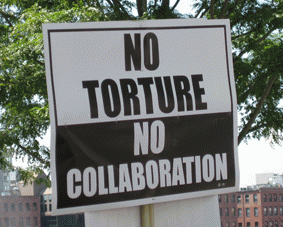"To be in an eight-by-eight cell in beautiful, sunny Guantanamo Bay, Cuba, is not "inhumane treatment." -- former Secretary of Defense Donald Rumsfeld
Following a seven-month investigation, in July the Hoffman Report presented extensive evidence of collusion between leaders of the American Psychological Association (APA) and Department of Defense (DoD) officials. This secret collaboration -- conducted over a period of years -- was aimed at ensuring that APA ethics policies would not constrain DoD interrogation-related activities, and that psychologists would remain in operational roles at Guantanamo Bay and other U.S. overseas detention centers.
The report includes a detailed examination of the APA's controversial 2005 Presidential Task Force on Psychological Ethics and National Security (PENS). The PENS task force, stacked with military intelligence representatives, asserted that Behavioral Science Consultation Team (BSCT) psychologists helped to keep detention and interrogation operations "safe, legal, ethical, and effective" -- despite multiple reports that health professionals were among the perpetrators of detainee torture and abuse.
Ideally, the Hoffman Report's revelations will serve as a springboard for long overdue soul-searching, accountability, and reform within the APA and the psychology profession. But disgruntled factions, including individuals identified in the report, are pursuing a deceptive and self-protective campaign designed to discredit the Hoffman Report, restore their reputations, and preserve business as usual at the APA.
The latest entry comes from an unsurprising source: the leadership of the APA's Division 19, the Society for Military Psychology. In November, a Division 19 task force (TF19) issued its critique of the Hoffman Report. Of particular note, the critique neither seriously addresses nor refutes the core elements of the APA-DoD collusion: namely, the covert agenda and secret correspondence, the manipulation and cover-up, and the strategic deception directed toward APA members and the general public.
Instead, the TF19 members seek to dismiss the Hoffman Report's findings by arguing that abuse at Guantanamo was already eliminated prior to the APA's PENS Report, and that BSCT psychologists effectively served to prevent abuse thereafter. For example, they assert:
The [Hoffman] report, with a decade of data to drawn upon, provides no evidence that following the PENS Report, any abuses occurred within the context of military interrogations where a BSCT psychologist was involved -- because there is no such evidence. There have been thousands of hours of interrogation support and observation provided by military psychologists conducted without incident.
(Note: You can view every article as one long page if you sign up as an Advocate Member, or higher).






